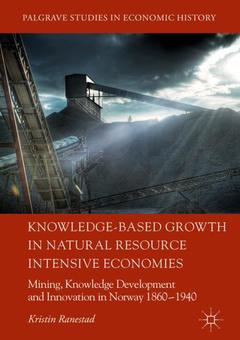Knowledge-Based Growth in Natural Resource Intensive Economies, 1st ed. 2018 Mining, Knowledge Development and Innovation in Norway 1860–1940 Palgrave Studies in Economic History Series
Auteur : Ranestad Kristin

This book rejects the idea that natural resource industries are doomed to slow growth. Rather, it examines the case of Norway to demonstrate that such industries can prove highly innovative and dynamic.
Here, the case is compellingly made that a key empirical problem with the popular ?resource curse? argument is that some of the richest countries in the world ? namely Norway, Sweden, Canada and Australia ? have all developed fast-growing economies based on natural resources. Analysis of innovation and knowledge development in natural resource industries reveal important new insights about the role of learning and innovation. These insights are key to understanding variances in growth levels between natural resource-based economies.
Ranestad illustrates how Norway?s high economic performance is built on knowledge-based natural resource industries. While Norwegian industries may have originated because of foreign technology and expertise, they thriveddue to further developments carried out by organisations within Norway. Ranestad looks at how these developments were possible due to the country?s high level of human capital, capacity for knowledge absorption and ability to adapt to new global technological and economic circumstances.
Part I: Theoretical and Historiographical Framework.- Chapter 1: Introduction.- Chapter 2: An Innovative and Growing Mining Sector.- Part II: Knowledge Development in Technologically Complex Mining: A Framework.- Chapter 3: Catching-up with World Mining: A Model of Mining Knowledge.- Part III: A Historical Empirical Analysis of Knowledge Organisations.- Chapter 4: The University, the Norwegian Institute of Technology (NIT), Technical Schools and the Mining School.- Chapter 5: Mining Companies: Domestic and Foreign Businesses.- Chapter 6: The Capital Goods Industry.- Chapter 7: National Geological Survey of Norway.- Part IV: Conclusion.- Chapter 8: Concluding Discussion and Remarks.
Date de parution : 11-2019
Ouvrage de 285 p.
15.5x23.5 cm
Disponible chez l'éditeur (délai d'approvisionnement : 15 jours).
Prix indicatif 73,84 €
Ajouter au panierDate de parution : 11-2018
Ouvrage de 285 p.
14.8x21 cm
Thèmes de Knowledge-Based Growth in Natural Resource Intensive... :
Mots-clés :
Economic Geography; Economic performance; Economic development; Metals extraction; Mineral extraction; Natural resource intensive economies; Geology; Chile; Nigeria; Venezuela; Scandinavia; Technological development; Smelting techniques; Engineering History; Geological mapping; Knowledge-based growth; Norwegian mining; The Capital Goods Industry; GDP in Norway



